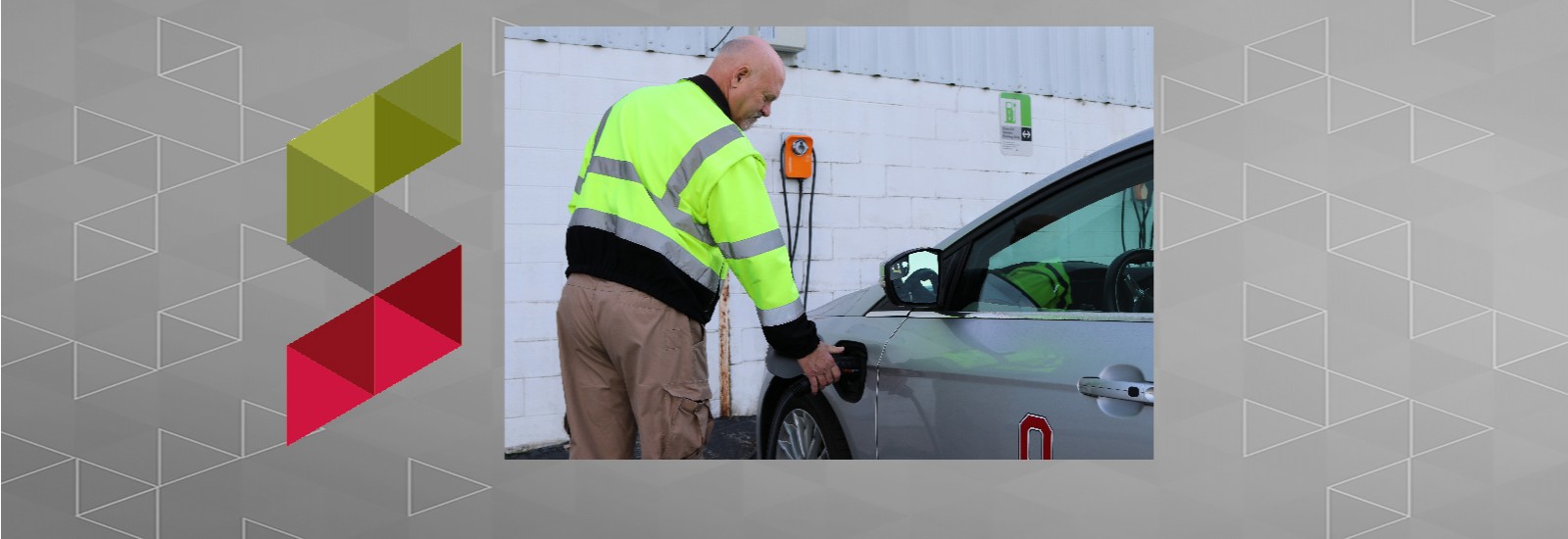By Olivia Smith
Toward Ohio State’s sustainability goal of reducing the carbon footprint of its fleet vehicles by 25 percent by 2025, the Department of Transportation and Traffic Management (TTM) is installing electric vehicle charging stations on campus and supporting university departments’ efforts to transition to alternative fuel vehicles.
Using a $375,000 grant from the President and Provost’s Council on Sustainability Ohio State Sustainability Fund, TTM is adding charging stations at the Columbus and regional campuses for university fleet vehicles.
That funding has so far supported six electric vehicle (EV) charging stations, which are in the Lane Avenue Garage (for the Blackwell), Northwest Garage, Blankenship and the Telecommunications Network Center (TMC) building. Four additional fleet EV stations are planned for 2019.
The stations have a data collection feature that can be used to see how much of an impact this change is making. The data, which also has helped support university faculty research, includes the license plate of the vehicle using the charger, the hours it remained plugged in and how much energy it consumed, as well as the charging station location and the number and length of charging sessions. All of this information is located on a dashboard that is synced from each charging station.
In addition to the stations supported by the Sustainability Fund, public charging stations are already available in the West Lane Avenue, South Campus Gateway and Ninth Avenue East garages as well as the Schumaker Student Athlete Development Complex and the Center for Automotive Research (CAR).
The future is vast for electric vehicles (EVs) on campus and beyond. According to Smart.Columbus.gov, electric vehicles have an estimated savings of $10,538 over five years and can travel more than twice as far as combustion vehicles on $1 of fuel.
“We’re also trying to support the goals of Smart Columbus by converting 5 percent of our own fleet by 2020,” says Beth Snoke, TTM director.
To meet that goal, the university would need to convert 50 of its approximately 1,000 vehicles, Snoke says. The investment in the EVs and the charging stations will result in lower costs over time.
TTM received $500,000 in funding from the President and Provost’s Council on Sustainability to encourage university departments at the Columbus and regional campuses to purchase alternative fuel fleet vehicles. Departments could apply for up to $10,000 toward the incremental cost of an electric vehicle (EV) and up to $20,000 toward the incremental cost of a compressed natural gas (CNG vehicle).
Seven university departments used the grant funding, purchasing 31 alternative fuel vehicles.
One of the first departments to reach out to TTM about adding an EV was the Blackwell Inn. In January 2018 the Blackwell replaced its 2010 Lincoln Town Car with a 2018 Ford Fusion Energi Titanium, a plug-in hybrid. TTM provided the Blackwell with a $10,000 grant to purchase the vehicle, which is used for the inn’s complimentary car service for guests.
“The management at the Blackwell has been in full support as long as the vehicle is able to meet and exceed guest expectations for comfort and aesthetic value,” says Graham Oberly, sustainability coordinator for Business Advancement, which operates the Blackwell. “Potentially, our airport shuttle will need to be replaced in the next few years, and if viable options are available for an EV shuttle, we would be interested.”
Snoke says reducing the university’s carbon footprint takes individuals being committed to sustainability.
“I’m fortunate to do that in my position overseeing the fleet here at Ohio State,” says Snoke. “If we can make an impact with those 1,000 vehicles and put those into some kind of alternative fuel, then we can make an impact on the quality of life in Columbus.”
Electric Charging Stations at Ohio State
Ohio State’s Sustainability Goals
Olivia Smith is a student communications assistant at the Sustainability Institute at Ohio State.
